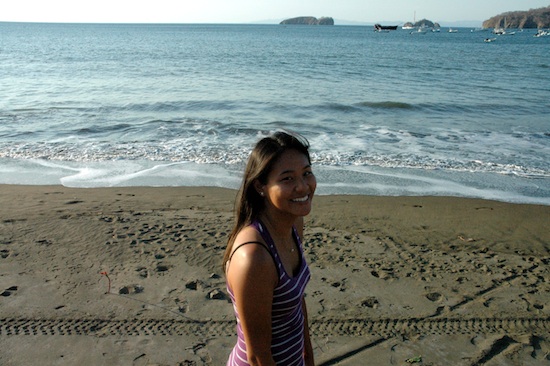5 Things that Completely Surprised Me about Living in Costa Rica

If anyone ever told you that living abroad in Costa Rica, or anywhere for that matter would be a magical, fairy tale paradisaical experience, take it lightly. Yes, living in Costa Rica is awesome, especially while on the beach.
However, when moving abroad you have to come with an open mind and open heart and be willing to be tested and put in tough situations at times.
It’s not easy moving to a brand new place, even if you’re in the same country. Costa Rica is no exception – many people market and advertise it as “living in paradise,” which it IS but that doesn’t mean coconut drinks on the beach and infinity pools everyday.
Imagine my surprise when I first moved down and how incredibly nice people were when I did try to practice my Spanish with them.
Unlike the expat community here in Coco, I’m not old or retired and I moved down here purely for love. At first, we had planned to live in San Isidro de Heredia but things changed and two weeks later we were at the beach. I didn’t think too much of what to expect or what it would be like to be honest. In fact, I was just so happy to finally be with Yeison!
I think no matter how much research you do and how prepared you think you are, there will always be things that surprise you when you’re finally there. Some are good, some are bad but that’s what the experience is all about!
Here are 5 things that surprised me when I moved to Costa Rica:
5 Things that Completely Surprised Me about Living in Costa Rica
1. Immersing in Spanish – Como Aprender Espanol?
I’ve had quite a few friends who studied abroad for 6 months or a year and came back completely fluent in the native language. I kind of expected the same when I moved here. I would be immersing myself, which apparently is the best way to learn and it wouldn’t be long before I would be watching telenovelas and reading los periodicos every morning.
Didn’t quite happen that easily. Since Coco is such a touristy area, many of the Costa Ricans speak English. And they love to speak English to you once they know you do! Many times I’ll have to ask them, can we please speak in Spanish? so that I can practice. Plus I don’t expect them to speak Ingles to me at all, I want to learn and practice!
Also this one is kind of my fault but since Yeison’s English is damn near as good as mine, it’s just easier for us to communicate in English than me stammering, sputtering and mumbling inaudible and unintelligible Spanish.
I found that I had to learn on my own – can’t count on other people to do it for me. I buckled down and did my research. Instead of enrolling in classes, I looked up apps and software that really helped me learn. I discovered that watching Grey’s Anatomy with Spanish subtitles helps a lot. Derek te amo. Eligeme, escogeme, amame!
2. Kindness of Costa Ricans
In the States, if you are an immigrant or foreigner and you don’t speak English very well, people aren’t that nice. I’ve witnessed this with my own eyes and ears as some Americans who have assumed I don’t speak English have mocked me right in my face and told me to go back to China. So my experiences with language barriers have all been ugly.
Imagine my surprise when I first moved down and how incredibly nice people were when I did try to practice my Spanish with them. Nobody ever made fun of me, nobody ever told me to go back home.
Instead they patiently listened, gently corrected my mistakes and when I said the few words I knew, you could tell they greatly appreciated the effort.
Another example of their kindness. If you’re ever in an emergency in Costa Rica, you might be surprised to see how many people are willing to help you.
One of my friends and her husband were driving in the middle of the countryside. Their car broke down, they had no cell phone and it was getting dark.
A truck full of teenage boys pulled up beside them and instead of taking advantage of their vulnerability, they helped them push their car to the next town and let them borrow their phone.
Stories like this are incredibly common here.
I’ve heard stories where a tourist fainted and a Costa Rican stayed with the couple to show the wife where the hospital was, 40 kilometers away. Yeison is the same way–he’ll help anybody who needs it. They do what seems to be above and beyond for us foreigners but really it’s just normal for them.
3. Not all Expats are Alike
You would think that every expat: American, British, Italian, Russian, whoever, would have the same mindset when they moved here. We’re here to experience a new culture, find a new life for ourselves and open our eyes to the world. We want to live in a peaceful country, to escape the rat race and the gossip and to just live simpler and more happily.
Nope. You ever heard the phrase, Some people never change? It applies to people here too. Coco is a very small town and a small community where everybody knows each other’s business or they deliberately pry into each other’s personal lives. For some reason, some expats here still like to stir up drama.
Some really are here to live a different life, some are here to live their same life, just by the beach. I’m not really sure why or how they can expect things to be exactly the same as in the States. It’s Costa Rica, things are done differently here as it would be in any other country in the world.
Costa Rica’s not a perfect country. There are definitely flaws but what system is perfect? None. Why move here if all you will do is complain and why move to a country where you don’t even like the locals?
4. Diversity
Costa Rica has a population of about 4.8 million people. Not a lot but it is a small country. The second time I visited Costa Rica, we went to Limon and Yeison pointed out many Chinese communities to me.
In San Jose, we met lots of Taiwanese people, which I was pretty surprised about. To be honest, I never thought of Costa Rica as one of the more popular places for people to move to. But in reality, it is.
I learned that Costa Rica has always been a popular country for people to immigrate to, especially from Asia and the Caribbean islands due to the huge appeal of the ability to make a new life and good money in the city.
Costa Rica is a large melting pot. You can find people from all over the world – heck Yeison is half-Korean-half-Costa-Rican! We’ve met many half-Costa-Ricans-half-Italians, half-Costa-Rican-half-Russian, half-Costa-Ricans-half-Chinese. Just all sorts of diverse people.
I love that the people here are incredibly accepting of all ethnic groups and they don’t call you Asian-Costa Rican. You’re a Costa Rican or a Tica, that’s it. None of this Asian-American, African-American stuff.
5. Subtle Culture Shock
It probably helped that I visited quite a few times before I moved here so I had an idea of what things were like. Living at the beach helped a lot too for sure. You always have a great central place to go to meet people, always have somewhere to go and something to do.
Besides the language, the rest of the culture shock was not as intense as I thought it would be. I remember the first time I went to Taiwan, the culture shock was so intense I almost went home the second night. As an 18-year-old who barely even explored her own hometown, it was a huge change. This time, I already had amazing support and experience, which was more than anything I could ever ask for!
It’s easy to fall in love with a place that has so much to do, so much to see and is beautiful every single day.
There are always ups and downs to living abroad but I’m loving it everyday. I suggest that everybody travels internationally for a little bit! It doesn’t have to be for a long period of time but just to experience something completely new and see the world in a different light.
This post was originally published on My Tan Feet. Photo for 5 Things that Completely Surprised Me about Living in Costa Rica by Samantha Wei.








